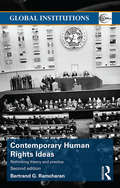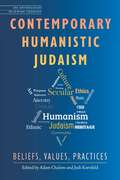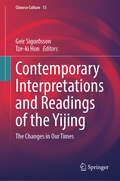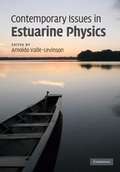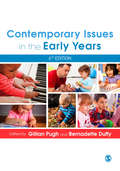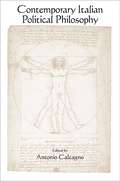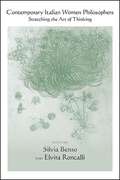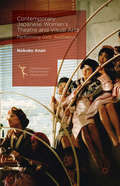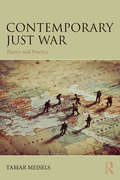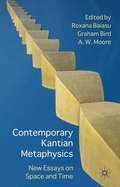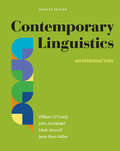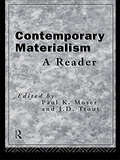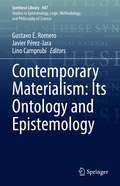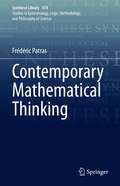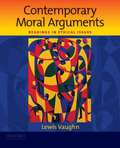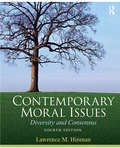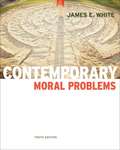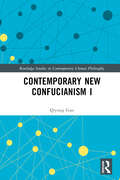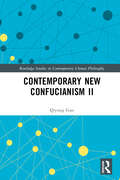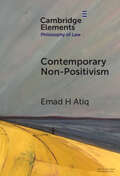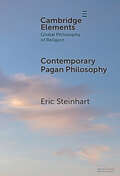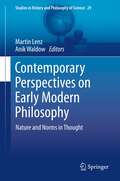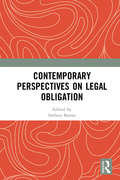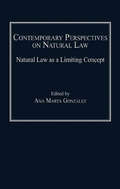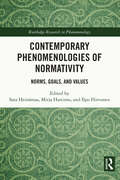- Table View
- List View
Contemporary Human Rights Ideas: Rethinking theory and practice (Global Institutions)
by Bertrand G. RamcharanWritten by a former UN High Commissioner for Human Rights (2003–4), this book has been fully updated for a second edition and continues to provide a much needed, short and accessible introduction to the foundational human rights ideas of our times and shows that every government is under international obligation to respect and uphold universal human rights. Updates include: Discussion of the recent intellectual challenges to the international human rights movement Examination of the establishment and functioning of the Human Rights Council and the Universal Review Process Evaluation of the developments in the area of the Responsibility to Protect and continued efforts to implement the right to development Inclusion of issues such as the push for compensation for slavery, experiments with democracy in a number of countries and the decisions of international judicial and human rights organs on conceptual and protection issues This book will be of great interest to students and scholars of Global Institutions, International Law and Human Rights.
Contemporary Humanistic Judaism: Beliefs, Values, Practices (JPS Anthologies of Jewish Thought)
by Adam Chalom Jodi KornfeldOpening up multidimensional ideas, values, and practices of Humanistic Judaism to Jews of all backgrounds and beliefs, Contemporary Humanistic Judaism collects the movement&’s most important texts for the first time and answers the oft-raised question, &“How can you be Jewish and celebrate Judaism if you don&’t believe in God?&” with new vision. Part 1 (&“Beliefs and Ethics&”) examines core positive beliefs—in human agency, social progress, ethics without supernatural authority, sources of natural transcendence, and Humanistic Jews&’ own authority to remake their traditional Jewish inheritance on their own terms &“beyond God.&” Part 2 (&“Identity&”) discusses how Humanistic Judaism empowers individuals to self-define as Jews, respects people&’s decisions to marry whom they love, and navigates the Israel-Diaspora relationship. Part 3 (&“Culture&”) describes how the many worlds of Jewish cultural experience—art, music, food, language, heirlooms—ground Jewishness and enable endless exploration. Part 4 (&“Jewish Life&”) applies humanist philosophy to lived Jewish experience: reimagined creative education (where students choose passages meaningful to them for their bar, bat, or b mitzvah [gender-neutral] celebrations), liturgy, life cycle, and holiday celebrations (where Hanukkah emphasizes the religious freedom to believe as one chooses). Jewish seekers, educators, and scholars alike will come to appreciate the unique ideologies and lived expressions of Humanistic Judaism.
Contemporary Interpretations and Readings of the Yijing: The Changes in Our Times (Chinese Culture #15)
by Tze-Ki Hon Geir SigurðssonThis book questions whether the ancient, iconic Chinese book of divination, The Classic of Changes (Yijing) might help us navigate the precarious, complex, and seemingly unpredictable intricacies of present contemporary times. The essays contained in this book respond affirmatively to this question in seeking to show how The Classic of Changes can help us think through the particularly human challenge of establishing meaning and making choices between alternatives. The author&’s book explores and discusses novel and often surprising ways for contemporary readers to interpret and apply this ancient Chinese classic, touching upon fields such as narration, technology, ecology, psychology, aesthetics, ontology, cognition, semiotics, and gender issues. This book is of appeal to both students and informed readers with an interest in the mysteries of The Classic of Changes, and to researchers in areas of Chinese philosophy, Chinese history, religious studies, and East Asian approaches to health and well-being.
Contemporary Issues in Estuarine Physics
by A. Valle-LevinsonEstuaries are of high socioeconomic importance with 22 of the 32 largest cities in the world located on river estuaries. Estuaries bring together fluxes of fresh and saline water, as well as fluvial and marine sediments, and contain high biological diversity. Increasingly sophisticated field observation technology and numerical modeling have produced significant advances in our understanding of the physical properties of estuaries over the last decade. This book introduces a classification for estuaries before presenting the basic physics and hydrodynamics of estuarine circulation and the various factors that modify it in time and space. It then covers special topics at the forefront of research such as turbulence, fronts in estuaries and continental shelves, low inflow estuaries, and implications of estuarine transport for water quality. Written by leading authorities on estuarine and lagoon hydrodynamics, this volume provides a concise foundation for academic researchers, advanced students and coastal resource managers.
Contemporary Issues in the Early Years: Working Collaboratively For Children
by Dame Gillian Pugh Bernadette DuffyIf you are a student or practitioner in the early years sector, you need to develop a rounded understanding of key issues in this fast-moving field. This new and updated edition provides a critical examination of the essential issues in early years policy and practice. With contributions from highly regarded practitioners and researchers, this book accessibly balances theory and practical concerns. The Sixth Edition has been extensively revised to include: A new chapter on Child Protection and Safeguarding Coverage of the new EYFS Theory and research evidence A Companion Website, highlighting further reading and current policies and frameworks. You can visit the Companion Website at www.uk.sagepub.com/pughduffy to view a video from the authors, and also access study materials including: Points for discussion Reflective tasks Further reading Web links.
Contemporary Italian Political Philosophy (SUNY series in Contemporary Italian Philosophy)
by Antonio CalcagnoItaly has a rich philosophical legacy, and recent developments and movements in its political philosophy have produced a significant body of thought by internationally renowned philosophers working on questions and themes such as the critique of neoliberalism, statehood, politics and culture, feminism, community, the stranger, and the relationship between politics and action. This volume brings this conversation to English-language readers, considering well-known Italian philosophers such as Vattimo, Agamben, Esposito, and Negri, as well as philosophers with whom English-language readers are less acquainted, such as Luce Fabbri, Adriana Cavarero, and Lea Melandri. In addition, the essays extend the conversation beyond the realm of Italian philosophy, bringing its thinkers into dialogue with philosophical figures including Badiou, Marx, Merleau-Ponty, Deleuze and Guattari, Adorno, Arendt, Foucault, Wittgenstein, and the Peruvian historian and sociologist Anibal Quijano.
Contemporary Italian Women Philosophers: Stretching the Art of Thinking (SUNY series in Contemporary Italian Philosophy)
by Silvia Benso; Elvira RoncalliGathering the contributions of eleven contemporary Italian women thinkers who share a philosophical practice, Contemporary Italian Women Philosophers embraces a general interrelationality, fluidity, and overlapping of concepts for a border-crossing that affects what it means to be subjects that are embodied and participants in the life of their communities, thereby shaping a sense of belonging. Common threads are revealed through the exploration of radically diverse themes (the body, subjectivity, power, freedom, equality, liberation, the emotions, symbolism and metaphors, maternity, reproduction, responsibility, the political, the economic) and approaches (autobiographical styles, personal narratives, rootedness in the everyday, advancement of relationality, empathic responsibility, passions, and commitment to the flourishing of the polis). In their differences, these previously unpublished essays give the reader a glimpse of the fecund and articulated philosophical work of women in the Italian context—a context which has not been and still is not always benign toward women's distinctive originality and creativity.
Contemporary Japanese Women’s Theatre and Visual Arts: Performing Girls’ Aesthetics (Contemporary Performance InterActions)
by Nobuko AnanThis book traces the history of 'girls' aesthetics,' where adult Japanese women create art works about 'girls' that resist motherhood, from the modern to the contemporary period and their manifestation in Japanese women's theatrical and dance performance and visual arts including manga, film, and installation arts.
Contemporary Just War: Theory and Practice (War, Conflict and Ethics)
by Tamar MeiselsThis book offers a renewed defense of traditional just war theory and considers its application to certain contemporary cases, particularly in the Middle East. The first part of the book addresses and responds to the central theoretical criticisms levelled at traditional just war theory. It offers a detailed defense of civilian immunity, the moral equality of soldiers and the related dichotomy between jus ad bellum and jus in bello, and argues that these principles taken together amount to a morally coherent ethics of war. In this sense this project is traditional (or "orthodox"). In another sense, however, it is highly relevant to the modern world. While the first part of the book defends the just war tradition against its revisionist critics, the second part applies it to an array of timely issues: civil war, economic warfare, excessive harm to civilians, pre-emptive military strikes, and state-sponsored assassination, which require applying just war theory in practice. This book sets out to reaffirm the basic tenets of the traditional ethics of war and to lend them further moral support, subsequently applying them to a variety of practical issues. This book will be of great interest to students of just war theory, ethics, security studies, war and conflict studies, and IR in general.
Contemporary Kantian Metaphysics
by Roxana Baiasu Graham Bird A. W. MooreThis collectionresponds to two needs in the literature. First, the Kantian tradition of thought about space and time represents a rich philosophical resource, insufficiently explored in Anglo-American philosophy. The volume explores this resource. More precisely, it questions a basic assumption of a powerful trend in contemporary metaphysics: the assumption that reality is spatio-temporally organised independently of us. Kant's revolutionary contribution to metaphysics was likewise to question this assumption. The volume draws attention to Kant's distinctive approach to metaphysics and breaks new ground by radically broadening the scope of recent discussions on space and time, in particular by examining certain connections which metaphysics and science have to epistemic agency. Second, contemporary Kantian philosophy is currently pursued along two lines of thinking developed in Anglo-American literature and European philosophy. This work brings their distinct claims into a productive dialogue on topical issues such as action, perception, the body, and cognition and its limits.
Contemporary Linguistics Seventh Edition
by William O’grady John Archibald Mark Aronoff Janie Rees-MillerContemporary Linguistics is one of the most comprehensive introduction to the fundamentals of linguistics, balancing engaging aspects of language study with solid coverage of the basics. Up-to-date scholarship, a direct approach, and a lucid writing style makes it appealing to instructors and beginning students alike and a resource that many students continue to use beyond the classroom.
Contemporary Materialism: A Reader
by Paul K. Moser J. D. TroutContemporary Materialism brings together the best recent work on materialism from many of our leading contemporary philosophers. This is the first comprehensive reader on the subject. The majority of philosophers and scientists today hold the view that all phenomena are physical, as a result materialism or 'physicalism' is now the dominant ontology in a wide range of fields. Surprisingly no single book, until now, has collected the key investigations into materialism, to reflect the impact it has had on current thinking in metaphysics, philosophy of mind and the theory of value. The classic papers in this collection chart contemporary problems, positions and themes in materialism. At the invitation of the editors, many of the papers have been specially up-dated for this collection: follow-on pieces written by the contributors enable them to appraise the original paper and assess developments since the work was first published. The book's selections are largely non-technical and accessible to advanced undergraduates. The editors have provided a useful general introduction, outlining and contextualising this central system of thought, as well as a topical bibliography. Contemporary Materialism will be vital reading for anyone concerned to discover the ideas underlying contemporary philosophy. David Armstrong, University of Sydney; Jerry Fodor, Rutgers University, New Jersey; Tim Crane, University College, London; D. H. Mellor, Univeristy of Cambridge; J.J.C.
Contemporary Materialism: Its Ontology and Epistemology (Synthese Library #447)
by Gustavo E. Romero Javier Pérez-Jara Lino CamprubíThis book provides an up-to-date revision of materialism’s central tenets, its main varieties, and the place of materialistic philosophy vis a vis scientific knowledge.Materialism has been the subject of extensive and rich controversies since Robert Boyle introduced the term for the first time in the 17th century. But what is materialism and what can it offer today? The term is usually defined as the worldview according to which everything real is material. Nevertheless, there is no philosophical consensus about whether the meaning of matter can be enlarged beyond the physical. As a consequence, materialism is often defined in stark exclusive and reductionist terms: whatever exists is either physical or ontologically reducible to it. This conception, if consistent, mutilates reality, excluding the ontological significance of political, economic, sociocultural, anthropological and psychological realities. Starting from a new history of materialism, the present book focuses on the central ontological and epistemological debates aroused by today’s leading materialist approaches, including some little known to an anglophone readership. The key concepts of matter, system, emergence, space and time, life, mind, and software are checked over and updated. Controversial issues such as the nature of mathematics and the place of reductionism are also discussed from different materialist approaches. As a result, materialism emerges as a powerful, indispensable scientifically-supported worldview with a surprising wealth of nuances and possibilities.
Contemporary Mathematical Thinking (Synthese Library #474)
by Frédéric PatrasThis book deals with the evolution of mathematical thought during the 20th century. Representing a unique point of view combining mathematics, philosophy and history on this issue, it presents an original analysis of key authors, for example Bourbaki, Grothendieck and Husserl. As a product of 19th and early 20th century science, a canon of knowledge or a scientific ideology, mathematical structuralism had to give way. The succession is difficult, still in progress, and uncertain. To understand contemporary mathematics, its progressive liberation from the slogans of "modern mathematics" and the paths that remain open today, it is first necessary to deconstruct the history of this long dominant current. Another conception of mathematical thought emerged in the work of mathematicians such as Hilbert or Weyl, which went beyond the narrow epistemological paths of science in the making. In this tradition, mathematical thought was accompanied by a philosophical requirement. Modernity teaches us to revive it. The book is intended for a varied public: mathematicians concerned with understanding their discipline, philosophers of science, and the erudite public curious about the progress of mathematics.
Contemporary Moral Arguments: Readings in Ethical Issues
by Lewis VaughnMore than any other contemporary moral problems reader, Contemporary Moral Arguments focuses on the key arguments that have provoked the most debate in recent ethical issues. The book opens with two introductory chapters on critical reasoning and moral theory, which provide the basis for understanding and analyzing the arguments in the subsequent issues chapters (chs. 3-12). In the conventional way, these readings on ethical issues are sorted into 10 topical chapters covering issues such as abortion, sex and marriage, terrorism and torture, economic justice, etc. But the readings within these chapters are organized unconventionally, by argument. Each argument is introduced by a briefing that sketches the argument, provides conceptual background for it, and reviews some of the main philosophical responses to it. After the briefing come two to four essays presenting the classic statement of the argument, critiques and defenses of it, and discussions of related debates.
Contemporary Moral Issues (4th Edition): Diversity and Consensus
by Lawrence M. HinmanCombines arguments and personal narratives to introduce students to key issues in morality. Contemporary Moral Issues is an anthology that provides a selection of readings on contemporary social issues revolving around three general themes: Matters of Life and Death, Matters of Equality and Diversity, and Expanding the Circle, which includes duties beyond borders, living together with animals, and environmental ethics. Each set of readings is accompanied by an extensive introduction, a bibliographical essay, pre-reading questions, and discussion questions. Learning Goals Upon completing this book readers will be able to: Understand what the key contemporary issues in morality are Understand how these issues are encountered in everyday life Develop a critical position in regard to each of the readings
Contemporary Moral Problems
by James WhiteCONTEMPORARY MORAL PROBLEMS made available to provide readers with a brief anthology for the study of the ethics of war, terrorism, torture, and assassination. Supported with problem cases, an illuminating introductory essay, and study questions, this text will engage students in one of the most crucial moral debates of our time.
Contemporary New Confucianism I (Routledge Studies in Contemporary Chinese Philosophy)
by Qiyong GuoAs the first volume of a two-volume seminal work on contemporary New Confucianism in China, this book charts the development of this intellectual trend and examines four leading thinkers of this intellectual movement in the 20th century. Contemporary New Confucianism refers to the Confucianism or Confucian thought that has emerged in China since the 1920s and that seeks to revive Confucian spirituality in a changing society. This volume first analyzes the cultural context, logical approach, major themes, and problems of New Confucianism before delving into the four leading figures, namely Liang Shumin, Xiong Shili, Ma Yifu, and Qian Mu. The chapter on Liang Shumin analyzes his concept of will, his arguments on Confucian moral ideals, and his theory of culture. It then discusses Xiong Shili's contribution to the philosophical metaphysics of New Confucianism. The following chapter on Ma Yifu examines his theory of the mind, nature, and the six arts. The final chapter on Qian Mu presents his views on nationality, history, and the Chinese classics. This title will appeal to scholars and students of modern and contemporary Confucianism, intellectual history, philosophy and thought of contemporary China, and comparative philosophy.
Contemporary New Confucianism II (Routledge Studies in Contemporary Chinese Philosophy)
by Qiyong GuoAs the second volume of a two-volume seminal work on contemporary New Confucianism in China, this book focuses on six leading thinkers of this intellectual movement in the 20th century. Contemporary New Confucianism refers to the Confucianism or Confucian thought that has emerged in China since the 1920s, which aims to revive the spirituality of Confucianism in a changing society. This volume introduces the philosophical thought of Zhang Junmai, Feng Youlan, He Lin, Fang Dongmei, Tang Junyi, and Mou Zongsan, including Zhang's political philosophy and comparative philosophy, Feng's transformation of Chinese philosophy, He's idea of culture and "spirit-only idealism," Fang's comparative philosophy, Tang's idea of moral self and theory of human spiritual realms, and Mou's new ontology for Confucianism. It analyzes their divergences and the contemporary relevance of their thought in terms of revisiting and transforming traditional Chinese philosophy and reconciling Chinese and Western traditions. This title will appeal to scholars and students of modern and contemporary Confucianism, intellectual history, philosophy and thought of contemporary China, and comparative philosophy.
Contemporary Non-Positivism (Elements in Philosophy of Law)
by Emad H. AtiqThis Element defends and clarifies the thesis that the legality of a system of rules depends on its moral features. Positivists who deny this dependence struggle to explain: (1) the traditional classification of moral norms as a form of a priori law; (2) judicial reliance on moral norms in legal discovery; (3) persistent theoretical disagreement about intra-systemic, law-determining facts; (4) why radically arbitrary or immoral schemes of social organization represent borderline cases of law; and (5) why law, like other artifacts, can be evaluated in a kind-relative sense (“as law”). Meanwhile, traditional versions of non-positivism overstate the dependence going further than the desiderata warrant. A moderate theory is formulated: law is an artifact whose existence depends on adequately performing an essentially normative function. The theory's justification lies in its explanatory power: a comparison with other “value-driven” artifacts, such as artworks, proves vital for understanding legal language, reasoning, and practice.
Contemporary Pagan Philosophy (Elements in Global Philosophy of Religion)
by Eric SteinhartOne of the most remarkable features of the current religious landscape in the West is the emergence of new Pagan religions. Here the author will use techniques from recent analytic philosophy of religion to try to clarify and understand the major themes in contemporary Paganisms. They will discuss Pagan concepts of nature, looking at nature as a network of animated agents. They will examine several Pagan theologies, and Pagan ways of relating to deities, such as theurgy. They will discuss Pagan practices like divination, visualization, and magic. And they will talk about Pagan ethics. Their discussions are based on extensive references to contemporary Pagan writings, from many different traditions. New Pagan religions, and new Pagan philosophies, have much to contribute to the religious future of the West, and to contemporary analytic philosophy of religion.
Contemporary Perspectives on Early Modern Philosophy: Nature and Norms in Thought (Studies in History and Philosophy of Science #29)
by Martin Lenz Anik WaldowNormativity has long been conceived as more properly pertaining to the domain of thought than to the domain of nature. This conception goes back to Kant and still figures prominently in contemporary epistemology, philosophy of mind and ethics. By offering a collection of new essays by leading scholars in early modern philosophy and specialists in contemporary philosophy, this volume goes beyond the point where nature and normativity came apart, and challenges the well-established opposition between these all too neatly separated realms. It examines how the mind's embeddedness in nature can be conceived as a starting point for uncovering the links between naturally and conventionally determined standards governing an agent's epistemic and moral engagement with the world. The original essays are grouped in two parts. The first part focuses on specific aspects of theories of perception, thought formation and judgment. It gestures towards an account of normativity that regards linguistic conventions and natural constraints as jointly setting the scene for the mind's ability to conceptualise its experiences. The second part of the book asks what the norms of desirable epistemic and moral practices are. Key to this approach is an examination of human beings as parts of nature, who act as natural causes and are determined by their sensibilities and sentiments. Each part concludes with a chapter that integrates features of the historical debate into the contemporary context.
Contemporary Perspectives on Legal Obligation
by Stefano BerteaBringing together world-class scholars who have devoted themselves to the study of legal obligation, this book addresses key dimensions of the current debate: providing novel insights and perspectives, as well as critically discussing the leading theories of legal obligation. The notion of legal obligation is widely regarded as fundamental by both legal practitioners and legal theorists. For the language that explicitly refers to obligation is pervasive insofar as paradigmatic legal materials make reference to obligation either directly, by specifying what a subject is obligated to do, or indirectly, by attributing rights, privileges, powers, permissions, and other normative statuses to both single individuals and groups. There is, then, broad agreement that obligation constitutes a central element in legal studies. At the same time, however, there is considerable disagreement among contemporary legal theorists about how legal obligation can or should be elucidated. This book accounts for both the significance of obligation in law and the variety of views of legal obligation championed in legal philosophy today. With contributions from renowned theorists, this book will be invaluable for scholars and students of legal theory, legal philosophy, and jurisprudence.
Contemporary Perspectives on Natural Law: Natural Law as a Limiting Concept
by Ana Marta GonzálezResorting to natural law is one way of conveying the philosophical conviction that moral norms are not merely conventional rules. Accordingly, the notion of natural law has a clear metaphysical dimension, since it involves the recognition that human beings do not conceive themselves as sheer products of society and history. And yet, if natural law is to be considered the fundamental law of practical reason, it must show also some intrinsic relationship to history and positive law. The essays in this book examine this tension between the metaphysical and the practical and how the philosophical elaboration of natural law presents this notion as a "limiting-concept", between metaphysics and ethics, between the mutable and the immutable; between is and ought, and, in connection with the latter, even the tension between politics and eschatology as a double horizon of ethics. This book, contributed to by scholars from Europe and America, is a major contribution to the renewed interest in natural law. It provides the reader with a comprehensive overview of natural law, both from a historical and a systematic point of view. It ranges from the mediaeval synthesis of Aquinas through the early modern elaborations of natural law, up to current discussions on the very possibility and practical relevance of natural law theory for the contemporary mind.
Contemporary Phenomenologies of Normativity: Norms, Goals, and Values (Routledge Research in Phenomenology)
by Sara Heinämaa Mirja Hartimo Ilpo HirvonenThis volume investigates forms of normativity through the phenomenological methods of description, analysis, and interpretation. It takes a broad approach to norms, covering not only rules and commands but also goals, values, and passive drives and tendencies. Part I "Basic Perspectives" begins with an overview of the phenomena of normativity and then clarifies the constitution of norms by Husserlian and Heideggerian concepts. It offers phenomenological alternatives to the neo-Kantian and neo-Hegelian approaches that dominate contemporary debates on the "sources of normativity." Part II "From Perception to Imagination" turns to the normativity of three basic types of experiences. This part first sheds light on the normativity of perception and then illuminates the kind of normativity characteristic of imagination and drive intentionality. Part III "Social Dimensions" analyzes the norms that regulate the formation of practical communities. It takes a broad view of practical norms, discussing social and moral norms as well as the epistemic norms of scientific practices. By clarifying the divergences and interrelations between various types and levels of norms, the volume demonstrates that normativity is not one phenomenon but a complex set of various phenomena with multiple sources. Contemporary Phenomenologies of Normativity: Norms, Goals, and Values will be of interest to researchers and advanced students working on issues of normativity in phenomenology, epistemology, ethics, and social philosophy.
